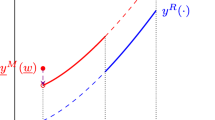Abstract
There are several ethical objections to the dependence on the status quo when bargaining mechanisms are applied to problems of collective choice and, in this context, there is also some discussion about how to define the status quo.
Can one think of bargaining mechanisms defined for some set of decision problems or of bargaining solutions for special problems that are independent of the status quo? Under which conditions do they exist? What are the crucial properties of the classical bargaining solutions or of bargaining mechanisms on economic environments implying dependence?
These questions are answered by two impossibility results. It turns out that the only crucial assumption we search for is the axiom of “Weak Individual Rationality”. We also point out the consequences of our results for the discussion mentioned above.
Similar content being viewed by others
References
Braithwaite, R. B. (1955):Theory of Games as a Tool for the Moral Philosopher. Cambridge: Cambridge University Press.
Gauthier, D. (1985): “Bargaining and Justice.” InEthics and Economics, edited by E. Frank-Paul, J. Paul, and F. D. Miller Jr. Oxford: Blackwell.
Imai, H. (1983): “Individual Monotonicity and Lexicographic Maximin Solution.”Econometrica 51: 389–401.
Kalai, E., and Smorodinsky, M. (1975): “Other Solutions to Nash's Bargaining Problem.”Econometrica 43: 513–518.
Kaneko, M., and Nakamura, K. (1979): “The Nash Social Welfare Function.”Econometrica 47: 423–435.
Klemisch-Ahlert, M. (1988): “Two Axiomatic Characterizations ofn-Person Bargaining Solutions.” Beiträge des Fachbereichs Wirtschaftswissenschaften der Universität Osnabrück, No. 8810.
Nash, J. F. (1950): “The Bargaining Problem.”Econometrica 18: 155–162.
— (1953): “Two-Person Cooperative Games.”Econometrica 21: 128–140.
Rawls, J. (1971):A Theory of Justice. Cambridge, Mass.: Harvard University Press.
Roemer, J. (1986): “The Mismarriage of Bargaining Theory and Distributive Justice.”Ethics 97: 88–110.
— (1988): “Axiomatic Bargaining Theory on Economic Environments.”Journal of Economic Theory 45: 1–31.
Sen, A. K. (1970):Collective Choice and Social Welfare. San Francisco: Holden Day.
Author information
Authors and Affiliations
Additional information
I am grateful to Wulf Gaertner for his encouraging comments. This research was supported by Deutsche Forschungsgemeinschaft.
Rights and permissions
About this article
Cite this article
Klemisch-Ahlert, M. Independence of the status quo? A weak and a strong impossibility result for social decisions by bargaining. Zeitschr. f. Nationalökonomie 53, 83–93 (1991). https://doi.org/10.1007/BF01227017
Received:
Revised:
Issue Date:
DOI: https://doi.org/10.1007/BF01227017




